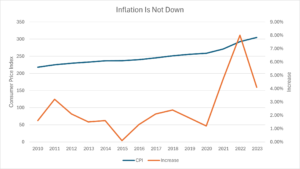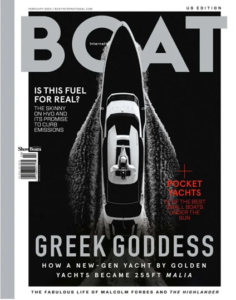I am furious that our news media is looking for any good news to support the Biden presidency. The news media is no longer about news … it is almost always about propaganda. This latest implication just makes my blood boil.
This morning’s “news” proclaimed that inflation is down to half of what it was. That is a lie. Inflation is higher than it has ever been … it is just the rate of the increase in inflation that has declined. In fact, as the graph shows, inflation these past few years is way above the levels for the prior administrations … both republican and democratic. Inflation is high.
Prices are not down … they are still sky high and painfully so for those trying to put food on the table. Yes, gasoline prices declined some from their high but they are still very high.
Perhaps the average American can see through this nonsense … perhaps not. All I know is that when I go the grocery store and pick up a box of cereal, it is the smallest box I can remember. Plus, the price is sky high. While I have stopped buying pancake mix, I am still struck by the price being twice or more higher than just a few years ago. Fortunately I am not suffering with these increases, but I know many are in our communities.
Perhaps most stunning of all is the price of fast food, especially hamburgers. Our son goes out to eat at Five Guys and racks up a $23 charge for one burger, French fries and a coke. Yes, it is a good sized meal … but really … are they kidding? So, I went to McDonalds and experienced the same thing even there although not quite as high with $14 for the trio.
By the way, I might suggest we study Waffle House over the past decade. By contrast, my occasional breakfasts at Waffle House have been pretty much the same price they have always charged. A big breakfast for about $10 plus a tip. Plus, I feel I am eating with family every time I dine there.
I am impressed with that, but I am incensed by our misinformation in the news. Worse yet, this morning the Wall Street Journal pointed out that the president is about to blame companies for raising prices over these past few years. Yes, the earnings may be up as well, but most of the cost increases were due to the government’s inflationary spending. Plus, the desire to have people working menial jobs earning a living wage doesn’t help.
I guess we will hear more about that tonight with the state of the union address. The state of the union is not good.
Take a look for yourself: https://www.wsj.com/articles/joe-biden-price-strike-force-business-consumers-white-house-council-of-economic-advisers-64178737?st=plb7phgnk6kutqx&reflink=desktopwebshare_permalink
Inflation is NOT down.
Author: Captain Obvious
Making a Difference
This statement is at the root of what most professionals want to do with their lives. And yet, the media seems focused on convincing us that others will do this for us if we will just pay for them to do so. Take a look at this article on energy impacts we can all make in our homes: https://www.nytimes.com/interactive/2024/climate/tax-breaks-inflation-reduction-act.html
Nowhere do you see the easiest one that everyone can do whether they rent or own their home: adjust the thermostat. Every degree can change energy used by heating or air conditioning by about 8% … one degree makes a huge difference. The online energy calculators we developed are just about everywhere and there is no mention of using them. These calculators will provide conservative and accurate predictions of savings for all ideas in the home and rank them as to financial impacts.
Try it for yourself: https://account.tecoenergy.com/EnergyAudit/Estimated
Nope, what you have is yet another article implying that you should invest in solar for your roof and be happy that our government will solve the long-term climate challenges by strokes of their pens and funding the winners that make this possible.
One has only to look at the legacy of this thought for the past four decades to prove this idea is faulty. The government has always backed the wrong horse and then declared themselves brilliant when the unbanned what they banned in the past or quietly bankrupted the firms they backed.
We all want a better world for ourselves and our children. We all know we should eat less processed food, exercise, get a good night’s sleep, and love one another along the way.
Yet, we are all getting lazier and lazier as time goes on in our quest for convenience. Amazon is striving for same day deliveries and that is simply amazing. Yet, my garbage is now consists almost totally of their packaging.
My wife Susan came up with a brilliant idea … why not leave the packaging from the previous delivery on our porch so they can pick it up and reuse or recycle it. After all, those nice people delivering them are already walking to our front door and returning to their trucks empty-handed.
Isn’t that a brilliant way to make a difference? Isn’t it a blinding flash of the obvious? If somebody out there can get Amazon’s attention and suggest this, please do.
Oh, and by the way, Amazon just introduced a fund to focus on recycling. You can see that here by searching for that topic on GreenBiz
Physician … heal thyself!
Abusement Parks
No, that is not a misspelling of amusement. This is what SeaWorld became known as resulting from a string of documented abuses of killer whales coupled with trainer deaths in their parks. The recent release of the movie Blackfish on Amazon Prime caused me to finally watch this documentary and to write this blog. The news around this is now ancient.
However, the story is relevant today on so many levels. When you see the Rotten series on Netflix (https://www.netflix.com/title/80146284) or Seaspiracy (https://www.seaspiracy.org/) or the other documentaries detailing animal with abuse in our food chain, you come away with a sickening feeling that corporate America is totally corrupt.
The talking points and counter arguments sound like the ones we heard as the tobacco industry struggled to persist and keep their business base as the dangers of smoking were continually exposed.
In like manner, as you watch Blackfish you see SeaWorld lying and twisting anything they could concoct into the justification to continue their killer whale performances. It took about a decade, but the end is now clear. They will be stopping orca performances and interactions completely as the stock of their animals eventually disappears.
I did not coin the term abusement parks. Here is the article that describes the situation:
https://theconversation.com/blackfish-how-captive-killer-whale-documentary-ended-seaworlds-orca-breeding-programme-161775
How does this relate to today and my audience for Captain Obvious? EVs are today’s blood diamonds. The facts are all there in plain sight … but the impacts are in countries where child abuse and human trafficking are so common they are just part of the system.
Watch the Rotten episode on chocolate, read the articles about avocados in Mexico, or see how China is raping our seas in Seaspiracy. The pattern is the same. What seemingly is a noble mission to feed the world is exploiting it at rates that are unsustainable and causing human suffering on a scale that would normally be defined as international war crimes.
As I consider these common illustrations of what we might call failings of being human, I am increasingly brought to the conclusion that we are not nearly as smart as these animals we are abusing. We are not the pinnacle of God’s creation. We are abusive at levels not seen in any other animal species, perhaps except for our closest genetic cousin, the chimpanzee.
Newt Gingrich was right to insist that all new members of Congress had to read Frans de Waal’s book Chimpanzee Politics. Sadly, we are about to lose Frans to cancer and will not be blessed with any more of his wonderful books on our primate relatives.
Thanks so much Frans for your fearless writing that exposes the truth about us and forces us to look in the mirror and consider the impact of our lives.
The Long Game vs Hype Cycles
I am encouraged to see the widespread news bulletins about company after company resenting the focus on quarterly stockholder reports. These tend to become episodic statements emphasizing or even bragging about corporate direction that follow trends and recent hype about this or that. This drug of stockholder acceptance seems to be pervasive and addicting.
It is also so uplifting to see other professionals who have echoed my concern. I especially like this one posted on linkedin.com: https://www.linkedin.com/pulse/playing-long-game-david-timis/
Whether it is DEI, ESG, EV, PV, AI or some other three or four letter trend summary, it seems almost everyone is more interested in painting the trending scoreboard target around where their arrows landed rather than carefully deciding which targets of opportunity they should consider shooting their limited arrows toward in the first place.
Anyone who is in touch with reality realizes quick fixes are simply not real, long-term strategic answers. That is, if your strategy is to truly lead your organization and not just be a puppet to the whims of the trends and your stockholders.
After all, it took us over 100 years to get here and it is going to take about that long to get us where we need to be on our energy portfolios. That is an indeterminably long period of time and very few business or spiritual leaders will stake their career on leadership challenge like that. It is instructive to see why previous leadership got us here, and their complete failure to look at the long game in life rather than follow short term wins.
They are like cats in a barn overrun with rats chasing this or that one as it crosses their path … grabbing a tasty meal along the way but missing the mark about how you get rid of rats in the first place. We are facing the cumulative effects of over 100 years of self-inflicted opportunistic answers to questions we shouldn’t have been asking in the first place.
Watch closely how executives respond to near term stockholder-driven desires for growth. Rarely do I see anyone working to educate their stockholders to understand the long haul strategic questions and decisions. This is why the Japanese eliminated quarterly stockholder reports. Growth for growth sake is at the root of just about everything that is wrong. Otherwise why would all the soda companies have half of their product as bottled water with its health hazards that we know now in microparticles.
Corporate America when confronted with the truth blows smoke, hires lobbyists, and funds research to at least delay the inevitable, except when their exclusive patents run out … which makes them hire researchers to prove their existing products need to be abandoned. See refrigerants, sugar substitutes, and a host of other food products.
Simple, sustainable, minimally processed foods are not what our public wants. They are addicted to salty snacks, zero calorie drinks, and convenience. Responsible citizenship requires training and this time a tearful Indian will not turn the tide like it did on polluting our rivers.
We have come a long way on cleaning up our atmosphere and with it we have witnessed an increase in the average earth’s temperature … after all, those particles and chemicals in the air were blocking sunlight. All the scientists know that, but you haven’t heard that have you? Why not? Could it be that showing the world that cleaning up the air has a consequence on the earth’s temperatures? It makes me a bit crazy that these same scientists are proposing putting seemingly harmless particles into the atmosphere to cool the planet. Funny on one level.
The movie Planet of the Humans makes this all clear. The facts are all there. We must change public opinion and first we must change political opinion. We need leadership here of a different sort. We need individuals who will stand up to the group think and chart a course to a truly sustainable future. It is encouraging to see that some at least are realizing this and trying to begin this transition.
One can only hope.
HVO as a Sustainable Superyacht Fuel
As you may know, we own a fairly large boat and that is why I get magazines like BOAT where the focus is on really large boats … superyachts. These are absurd floating palaces and most of them are rented for a week or more rather than owned by individuals for their own use.
Well, perhaps not surprisingly, these fuel guzzlers are targets for environmentalists and energy stewards. So, it was interesting to me that the focus on energy sustainability has made its impact on this segment of the world economy. They are looking seriously at the ways they can be green. After all, they must clean up their image if for no other reason than to let their users feel OK about using them.
This month’s issue of BOAT had a feature article about HVO: Hydrotreated Vegetable Oil. This is deemed better than FAME: Fatty Acid Methyl Ester … aka biodiesel. The way it is made to be environmentally acceptable is by reclaiming deep fat fryer waste oil.
Some of you will jump to the conclusion that this is truly ridiculous because the scale of waste oil availability plus the disperse collection and processing logistics are absurd. We have enough proof that even recycling paper and plastics has proven difficult with less than 10% being recycled. But let’s dismiss our sense of practical reality and do some math.
The amount of canola oil (the most common oil used in deep fat fryers) annually is approaching 2000 million pounds which is about 0.71 million gallons per day. Let’s assume we recycled all of that. After all, that sounds like a big number.
The oil production in the world is about 80 million barrels per day … or about 3,200 million gallons per day. So, if all the canola oil used in the world were recycled into HVO it wouldn’t change the number. It simply doesn’t matter a bit.
Should all superyachts be sail powered? Ironically, that wouldn’t change much since sailing yachts use a lot of the fuel to produce power when anchored. Plus, something most people don’t know … sailboats often have to use diesel engines because the wind is not there or would make the passage difficult.
The obvious question no one wants to ask or answer is why are we using these vessels in the first place? Once we answer that, the optimization of world resources can commence.




